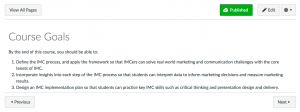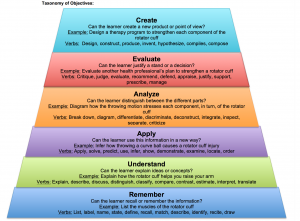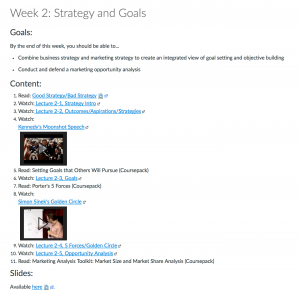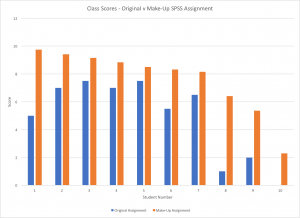My name is Ed Jaffe, and I live a double life. By day, I am the strategy lead for Watson Marketing at IBM, which is the group that creates technology for marketers. By night I am an adjunct in the Integrated Marketing Communications online program at Medill. And not always by night – sometimes also by weekend. And lunch breaks. And by day (but don’t tell my boss).
My double life started in the summer of 2016, when I was fortunate enough to be offered a position teaching a course called The Integrated Marketing Communications Strategic Process. The offer seemed straightforward enough – take a successful and long-running in-person class (a class that I took when I was in the IMC program) and design it to be taught online. Originally it was my intention to take much of the existing content and deliver it online, however, teaching someone else’s content is hard, because it’s someone else’s. I wanted to make the class mine, and I spent the remainder of 2016 designing, writing, and recording my course. The course went live in winter 2017, and I am teaching it again in the summer.
Having lived a double life for almost a year, I’ve learned how to make the most out of the time I spend on my second, but favorite job (again, don’t tell my boss). In this post, I’ll share with you the 6 lessons I learned from successfully teaching my first class at Northwestern.
Lesson 1: Work with a good learning engineer
Lesson 2: Stick to your policies
Lesson 3: Set class norms
Lesson 4: You have a network. Use it
Lesson 5: Be flexible
Lesson 6: Love the job
Lesson 1: Work with a good learning engineer
When my double life began, I had no idea how to teach. I knew how to present, however, effective teaching entails much more than just speaking in public. Fortunately, I was paired with Heather Haseley, a Northwestern Learning engineer. Not only did Heather teach me how to create goals and design a course, but also, she was an advisor who knew what worked (and what didn’t) in other classes. When you live a double life, your time is limited; having a good learning engineer enables you to focus on building your class instead of trying to figure out how to build your class.
But before I wrote any content, Heather helped me write overarching, as well as weekly learning goals. This process took about a month, but it was time well spent. My learning goals became my roadmap – they helped me frame what I would teach each week of the course. And, using Bloom’s Taxonomy as a framework, my goals helped me define how I would measure the students each week. For example, I can’t measure if a student understands the various methods used to value customers, but I can measure their ability to describe those methods.
Once my goals were written, I was able to start putting my content together. But an online course is very different than an in-person course, and a good learning engineer is key to designing a course to be taught online. In an online setting, instructors often have to face shorter attention spans than an in-person setting; students simply aren’t going to watch an hour-long lecture video. A good online course includes lots of short lecture videos, and also mixes different types of content in between the lectures.
Lesson 2: Stick to your policies
When my double life began, I had no idea that I’d have to make so many decisions about the course. Should assignments be worth 10 points, or 100 points? What should the grading rubric look like? When will assignments be due? This was another reason having a learning engineer was key to being successful – Heather was able to help me decide which policies would be best for my course. And what I learned is that, to successfully live your double life, you need to set clear policies and stick to them.
 One of the most important policies for a professor is the policy regarding late assignments, and my policy was simple: late assignments weren’t accepted (with the exception of severe illness or family emergencies). Each week, assignments were due on Sunday at 9PM. This policy helped me with my double life in two ways – I knew consistently each week when I’d have to make time to grade assignments, and I rarely had to adjudicate whether I’d accept a late assignment. For example, in the last week of the course, a student submitted an assignment 11 minutes late, and I didn’t accept it. While 11 minutes might not be a lot of time, I had no way of fairly deciding an “acceptable” amount of time that something could be late. You might feel like a jerk when you have to say no to a student, but having clear policies from the beginning means you can spend time on student engagement instead of adjudicating policy decisions.
One of the most important policies for a professor is the policy regarding late assignments, and my policy was simple: late assignments weren’t accepted (with the exception of severe illness or family emergencies). Each week, assignments were due on Sunday at 9PM. This policy helped me with my double life in two ways – I knew consistently each week when I’d have to make time to grade assignments, and I rarely had to adjudicate whether I’d accept a late assignment. For example, in the last week of the course, a student submitted an assignment 11 minutes late, and I didn’t accept it. While 11 minutes might not be a lot of time, I had no way of fairly deciding an “acceptable” amount of time that something could be late. You might feel like a jerk when you have to say no to a student, but having clear policies from the beginning means you can spend time on student engagement instead of adjudicating policy decisions.
Policies aren’t always about enforcement, and they can actually be used to drive better outcomes and improve the class. One of my personal goals is for students to focus more on learning than grades; in my course, if a student does all of the individual assignments, I drop the lowest individual grade (I call it the “everybody gets one” policy). This policy gave the students a bit of breathing room if they struggled with a concept, or if they just had a bad week. But it also saved me time as I believe it reduced the amount of grade related messages I received, and it increased the number of concept related messages.
 You can also use lessons learned in your day job to influence policies in your class. For example, I still see a great deal of 4:3 (letterbox) slides in professional environments, even though it’s 2017 and everyone has 16:9 (widescreen) monitors; 4:3 slides aren’t accepted in my class for any reason. Also, I believe strongly in brevity and plain language, and made it clear on my grading rubric that buzzwords aren’t acceptable in my course. I am proud to say that not one student “leveraged synergies” or “disrupted paradigms.”
You can also use lessons learned in your day job to influence policies in your class. For example, I still see a great deal of 4:3 (letterbox) slides in professional environments, even though it’s 2017 and everyone has 16:9 (widescreen) monitors; 4:3 slides aren’t accepted in my class for any reason. Also, I believe strongly in brevity and plain language, and made it clear on my grading rubric that buzzwords aren’t acceptable in my course. I am proud to say that not one student “leveraged synergies” or “disrupted paradigms.”
Lesson 3: Set class norms
When my double life began, I didn’t know how to foster a class community in an online environment, but I knew it was important – I wanted the students to learn as much (if not more) from each other as they did from me. And when it came to group work, I wanted the students to solve conflicts among themselves before bringing them to me. But group dynamics can be difficult enough for full-time students who are in the same building, let alone for online students in different time zones. Setting these class norms at the beginning helped set the right tone for the class environment:
- We will treat each other with respect.
- We will have open and honest communication.
- We will recognize that we have diverse backgrounds, and be cognizant that others have different viewpoints and experiences.
- We might disagree with each other, but we will never insult or disparage our classmates.
- We will be punctual – whether it’s attending meetings or submitting assignments.
- We will always act with integrity.
 It wasn’t enough to have my norms – I wanted the students to set their own as well. The course had 5 project teams, and the first assignment was to write team norms (along with a fun team name). The assignment wasn’t graded, and the students automatically earned points just for doing it. Frankly, I wasn’t concerned with what the students wrote, but I wanted them to take the time to think about how they would work together. Here’s an example of what one group submitted as their norms:
It wasn’t enough to have my norms – I wanted the students to set their own as well. The course had 5 project teams, and the first assignment was to write team norms (along with a fun team name). The assignment wasn’t graded, and the students automatically earned points just for doing it. Frankly, I wasn’t concerned with what the students wrote, but I wanted them to take the time to think about how they would work together. Here’s an example of what one group submitted as their norms:
1) Connect early and often on plans and expectations for each project.
2) Communicate by text message.
3) Create an outline for topics to tackle during Blue Jeans meetings.
4) Feel comfortable to disagree with members of the team.
(As long as you adhere to class norms and disagree respectfully, it will ensure the group has
thoroughly considered options and information and will improve the final result.
5) Have fun!
When I asked for student feedback at the end of the course, many students told me that creating norms at the beginning of the course led to the best group experiences they had in their time at Medill.
Lesson 4: You have a network. Use it.
When my double life began, I had to accept the fact that, as much as I know about digital marketing, there’s a lot that I don’t know. However, I have a network full of smart people. Almost every week, I br ought in a different guest speaker to add context to my content (because it was an online course, I recorded interviews with each guest). This helped me live my double life, because it meant I didn’t have to be the expert in each topic presented in class. It was also great for the students, who got to hear from industry experts, and for the guests, who could add “Guest Lecturer at Northwestern University” to their LinkedIn Profiles.
ought in a different guest speaker to add context to my content (because it was an online course, I recorded interviews with each guest). This helped me live my double life, because it meant I didn’t have to be the expert in each topic presented in class. It was also great for the students, who got to hear from industry experts, and for the guests, who could add “Guest Lecturer at Northwestern University” to their LinkedIn Profiles.
For example, one of my class topics is identity resolution, which is a complex series of processes and technologies that marketers use to identify customers across disparate touchpoints. I included a five minute introduction of my own content in the lecture, however, I wanted to include more. I could have spent months researching this topic alone, and still wouldn’t know nearly as much as my friend Joe Stanhope, VP and Principal Analyst at Forrester Research, so I invited him to speak in my course.
Not only did Joe record a fantastic interview in the Medill studio, but he also joined the class for a live sync session. This allowed the students to hear from an expert in real-time, and Joe answered questions that I simply didn’t have the knowledge to answer. Note that guests don’t have to join live – a different guest joined us on the discussion boards, which allowed the students to engage with the guest even if they couldn’t make it to the live sync session.
Lesson 5: Be Flexible
When my double life began, I tried to plan for everything. But I quickly learned that, no matter how well designed a course is, no matter how much time is spent planning, not everything is going to work. Living a double life means having enough flexibility designed into the course that you can adjust quickly as challenges arise, and still keep a balanced schedule.
I almost had an assignment derail my class in the first week. I assigned a data analysis that used SPSS, a statistical package that had been used previously in IMC. It was intended to be a baseline skills assessment, however, for a number of reasons, the students didn’t do as well as I was hoping – the average score was 6/10 (which could lead to the argument that the baseline skills assessment did exactly what it was intended to do).
Rather than have the students use their dropped grade on this assignment, I offered a make up assignment. First, I offered two SPSS sessions that were delivered via BlueJeans. Then, I wrote a similar assignment using a different dataset, and gave the students two weeks to turn it in. More than half of the students redid the assignment, and their grades improved by an average of nearly three points. One student, who got a 5/10 on the first assignment, emailed me saying that they thought they were starting to get the hang of SPSS, and asked how they did on the make-up. I got to respond: “You crushed the make-up assignment – 9.75/10. Well done!” I couldn’t have been more proud.
Lesson 6: Love the job
When my double life began, I had no idea it would be so time consuming. Or, frankly, so difficult. Balancing your double life ultimately boils down to two things: planning, and loving the job.
Spending as much time as I did planning the course paid dividends – I was able to write a quarter’s worth of content in about two months, and filmed it all in about five days. It’s also important to make a plan for each week, so you know when you’ll respond to student emails, when you’ll post on discussion boards, etc. Having a plan allows you to focus your time, because time is always short when you’re leading a double life. But that’s one of the trade-offs, and successfully living a double life means being ok making trade-offs. You might have to give up a Friday night so you can grade papers. You could probably make more money consulting (hell, your TA probably makes more per hour than you do). But that’s not why you do this job.
You do this job because you love teaching. You love seeing what happens when something “clicks” for one of the students. You love sending emails saying “you crushed this assignment.” You love getting to know the students. You love getting messages from guests saying how impressed they are with the questions the students ask. And you love reading the discussion boards to see how the students interpreted your questions.
Love the job, because when you have students telling you they enjoyed the class, and when you build positive student relationships (I’m still excited about being called a “lovable nerd” in a CETC), you’ll know it’s all worth it.
About the author
Ed Jaffe is a marketing technologist and IMC adjunct lecturer, and is currently the Strategy Lead for Watson Marketing at IBM. His IMC Strategic Process course helps students implement IMC by combining classic strategy and finance principles with modern marketing and advertising technology. He holds a MS in IMC from Northwestern University and a BS in Sport Management from UMass.







Social networks are great to provide and information to the public, social networks are the fastest way to communicate with the public. Thank you Informative article.
Graphic Designing Company in Chandigarh
Thank you for sharing, what’s next?
Thanks for sharing this useful imformation. my website : dewa slot 777
Thanks for sharing this useful information. my website : bonanza88
Situs cnnslot gacor paling di cari tahun 2922.
مصانع اثاث فرنسي كلاسيك تشمل تشكيلة الأثاث الفرنسي الكلاسيكي الأنيقة مجموعة متنوعة من القطع مثل الأرائك الفاخرة، والطاولات الجانبية الأنيقة، والأثاث الخشبي المزخرف بالنقوش الفنية. بفضل جودة المواد المستخدمة والتفاصيل الراقية، تعد مصانع الأثاث الفرنسي الكلاسيكي مرادفًا للتميز والرفاهية في عالم الديكور الداخلي.